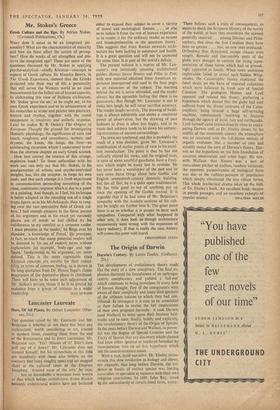The Origin of Darwin
Darwin's Century. By Loren Eiseley. (Gollancz,
THE development of evolutionary theory reads, like the story of a slow conspiracy. The, final ex- plosion,shattered the foundations of an anthropo- centric complacency and yielded a 'fall-out' which continues to bring mutations in 'every field of human thought. Few of the conspirators were aware of their complicity and many died ignorant of the ultimate treason 'to which they had con- tributed. In'retrospect it is easy to be astonished at their failure to realise the full implications of their own pregnant formulae: it look Darwin (and Wallace) to seize upon their hesitant half- truths and to state, finally, boldly and explicitly, the revolutionary theory of the Origin of Species. In the years before Darwin and Wallace, so power- ful was the dogma of Special Creation and the Fixity of Species that any discovery which clashed had been either ignored or rendered harmless by incorporation into an ad hoc hypothesis which left the central structure intact.
With a taut, lucid narrative, Dr. Eiseley recon- structs this slow revolution in biology and shows, for example, that long before Darwin, the evi- dence in fossils of extinct species was .forcing naturalists to speculate at variance with their own religious convictions. In 1695, John Ray, vexed by the unfamiliarity of certain fossil ferns, wrote:
'There follows such a train of consequences, as seems to shock the Scripture-History of the novity of the world; at least they overthrow the opinion generally received . .. among Divines and Philo- sophers, that since the ,first Creation there have been no species . . . lost, no new ones produced.' Orthodoxy thus threatened, escape clauses were sought. Remote and inaccessible parts of the globe were thought to contain the living repre- sentatives of those forms which had so provok- ingly appeared as fossils. When more ambitious exploration failed to reveal such hidden Whip- snades, the Catastrophic theory explained the fossil strata on the basis of repeated calamities which were followed by fresh acts of Special Creation. The geologists Hutton and Lyell opposed and refuted this theory, preferring a hypothesis which denied that the globe had ever suffered from the divine tantrums of the Catas- trOphists; being instead a huge self-servicing machine, continuously renewing its features through the agency of wind, rain and earthquake. Lyell himself came extraordinarily close to antici- pating Darwin and, as Dr. Eiseley shows, by the middle of the nineteenth century the atmosphere was so saturated with the full-blown notions of organic evolution that a number of men had actually stated the core of Darwin's theiary. Dar- win set the hypothesis on the firm foundation of accurate observation and sober logic. He saw, with Wallace, that Nature was a sort of miraculous pitcher of endless, random' Variation; the apparent purposiveness of biological form was due to the nithless• pressure of population which simply eliminated the less • robust forms. This whole intellectual drama takes up the bulk of Dr. Eiseley's book. An excellent book, despite its purple passages, and an excellent example bf










































 Previous page
Previous page